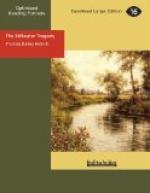protested against the displacement of its weather-stained
predecessor; it seemed to him an act little short of
vandalism; but Mr. Slocum was obstinate, and would
have it done. He was secretly atoning for a deep
injustice, into which Richard had been at once too
sensitive and too wise closely to inquire. If
Mr. Slocum had harbored a temporary doubt of him Richard
did not care to know it; it was quite enough to suspect
the fact. His sufficient recompense was that
Margaret had not doubted. They had now been married
six months. The shadow of the tragedy in Welch’s
Court had long ceased to oppress them; it had vanished
with the hasty departure of Mr. Taggett. Neither
he nor William Durgin was ever seen again in the flesh
in Stillwater; but they both still led, and will probably
continue for years to lead, a sort of phantasmal,
legendary life in Snelling’s bar-room.
Durgin in his flight had left no traces. From
time to time, as the months rolled on, a misty rumor
was blown to the town of his having been seen in some
remote foreign city,—now in one place, and
now in another, always on the point of departing, self-pursued
like the Wandering Jew; but nothing authentic.
His after-fate was to be a sealed book in Stillwater.
“I really wish you had let the old sign stand,” said Richard, as the carpenters removed the ladders. “The yard can never be anything but Slocum’s Yard.”
“It looks remarkably well up thee,” replied Mr. Slocum, shading his eyes critically with one hand. “You object to the change, but for my part I don’t object to changes. I trust I may live to see the day when even this sign will have to be altered to—Slocum, Shackford & Son. How would you like that?”
“I can’t say,” returned Richard laughing, as they passed into the yard together. “I should first have to talk it over—with the son!”
The End



